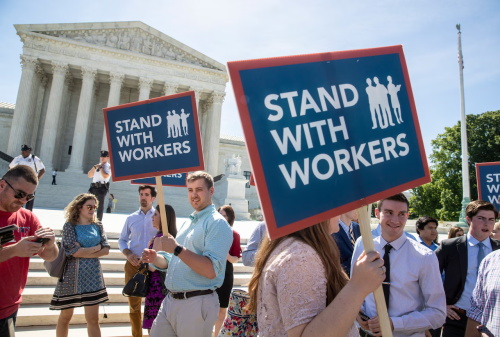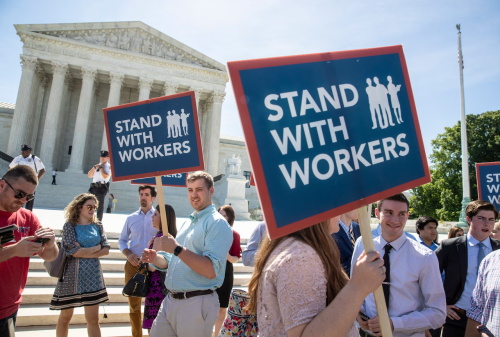The Rising Tide of Organized Labor Disputes: Why Leaders Should Pay Attention

Organized labor disputes are on the rise in the United States, and the implications are profound. In recent years, there has been a noticeable shift in dynamics between workers and management, with a surge in labor activism and unionization efforts. For leaders in business and entrepreneurship, paying attention to this trend is crucial, as it carries significant implications for the present and future of employment in the country.
According to data from the U.S. Bureau of Labor Statistics, the number of major work stoppages involving 1,000 or more workers has been steadily increasing since 2017. In 2018, there were 20 major work stoppages, involving approximately 485,000 workers, the highest number since 2007. This trend continued in 2019 and 2020, with 25 and 23 major work stoppages, respectively. While the COVID-19 pandemic caused a temporary dip in 2020, the numbers have rebounded in 2021 and 2022, signaling a sustained uptick in labor activism.
There are several reasons behind this resurgence in organized labor disputes. One of the primary drivers is the growing discontent among workers regarding issues such as stagnant wages, inadequate benefits, and poor working conditions. Despite a strong economy and record corporate profits in recent years, many workers have seen little improvement in their standard of living. As a result, they are increasingly turning to collective action to demand better treatment and fair compensation.
Furthermore, the COVID-19 pandemic has exposed and exacerbated existing inequalities in the workplace. Essential workers, including those in healthcare, grocery, and delivery services, have borne the brunt of the pandemic, often risking their health and safety to keep the economy running. However, many of these workers have been poorly compensated and lack adequate protections. This has fueled resentment and prompted calls for greater workplace rights and protections.
Another factor contributing to the rise in organized labor disputes is the changing nature of work itself. The gig economy, characterized by temporary and freelance work, has grown significantly in recent years, offering flexibility for workers but also insecurity and lack of benefits. Workers in industries such as ride-hailing, food delivery, and freelance writing have increasingly sought to organize and unionize to address these issues and advocate for their rights.
For leaders in business and entrepreneurship, the increasing frequency of organized labor disputes carries several implications. Firstly, it underscores the importance of maintaining positive labor relations and addressing the concerns of employees. Companies that fail to listen to their workers and address their grievances risk facing costly and disruptive labor actions that can harm their bottom line and reputation.
Secondly, the rise in organized labor disputes highlights the need for businesses to adopt fair labor practices and provide competitive wages and benefits. In today's increasingly competitive labor market, companies that offer attractive compensation packages and prioritize the well-being of their employees are more likely to attract and retain top talent. Moreover, treating workers fairly and with respect can enhance employee morale, productivity, and loyalty, leading to better business outcomes in the long run.
Additionally, the resurgence of organized labor presents an opportunity for businesses to reevaluate their approach to labor relations and adopt more collaborative and inclusive practices. By involving workers in decision-making processes and listening to their concerns, companies can build trust and foster a positive work environment. This, in turn, can help mitigate the risk of labor disputes and improve overall organizational performance.
Moreover, leaders in business and entrepreneurship should pay attention to the broader socio-economic trends driving the rise in organized labor disputes. Income inequality, job insecurity, and the erosion of worker rights are not only moral issues but also have far-reaching implications for the economy as a whole. Addressing these issues requires a concerted effort from businesses, policymakers, and civil society to create a more equitable and inclusive economy that works for everyone.
In conclusion, the increasing frequency of organized labor disputes in the United States is a trend that business and entrepreneurship leaders cannot afford to ignore. It reflects growing dissatisfaction among workers with their employment conditions and highlights the need for businesses to adopt fair labor practices and prioritize the well-being of their employees. By paying attention to these trends and taking proactive steps to address the concerns of workers, companies can build stronger and more resilient organizations that are better positioned to succeed in the long term.
Recommend for you:

The Rising Tide of Organized Labor Disputes: Why Leaders Should Pay Attention
Organized labor disputes are on the rise in the United States, and the implications are profound. In recent years, there has been a noticeable shift in dynamics between workers and management, with a surge in labor activism and unionization efforts.
How a Chance Encounter in an Uber Led to a Billion-Dollar Solution?
In the world of entrepreneurship, success often stems from unexpected beginnings.
Who You Hire Matters — Building a Team That's Built to Last
In the labyrinth of challenges that besiege small businesses, one factor towers above the rest in determining success: the team you assemble.
7 Ways to Use AI to Boost Your Leadership Capabilities
Success in the fast-paced commercial environment of today depends on having good leadership.
